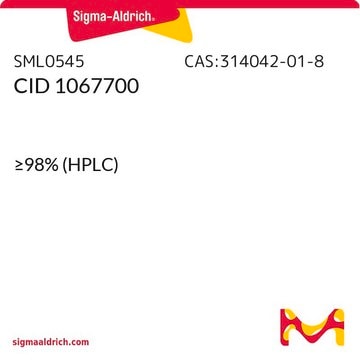SAE0107
3-Methyladenine Ready made solution
≥98% (HPLC), 7.5mg/ml (50mM) in MES buffer, Autophagy inhibitor
Synonyme(s) :
3-MA, 6-Amino-3-methylpurine, autophagy inhibitor
Se connecterpour consulter vos tarifs contractuels et ceux de votre entreprise/organisme
About This Item
Code UNSPSC :
12352202
Nomenclature NACRES :
NA.51
Produits recommandés
Pureté
≥98% (HPLC)
Forme
liquid
Concentration
7.5 mg/mL
Conditions d'expédition
ambient
Température de stockage
−20°C
Catégories apparentées
Description générale
3-Methyladenine (3-MA) is a methylated derivative of adenine that has been used as an In vivo marker for the methylation of DNA. 3-Methyladenine and 7-methylguanine are the two main N-methylpurines formed in DNA upon exposure to methylating agents. 3-MA is removed from damaged DNA via the DNA base excision repair pathway, which begins with the enzyme N-methylpurine DNA glycosylase. The dependence of 3-MA repair on nucleotide excision repair in mammalian cell lines has been studied.3-MA have been widely used as autophagy inhibitor based on its inhibitory effect on class I and class III PI3K activity, which is known to be essential for induction of autophagy. 3-MA blocks class I PI3K persistently, whereas its suppressive effect on class III PI3K is transient, understanding the dual role of 3-MA in autophagy thus suggests that caution should be exercised in the application of 3-MA in autophagy study.
Furthermore, 3-MA is also capable of making the reduction of lymphocyte number caused by chronic stress rebound, implying that inhibition of autophagy can rescue chronic stress-induced immunosuppression.
Autophagy has been reported to play an important role in the 3, 4-Methylenedioxymethamphetamine MDMA-induced neurotoxicity in the mixed neuronal-glial primary culture and it was found that 3-MA ameliorate MDMA-induced autophagy, SERT loss, HPA axis dysfunction, and depressive behaviors.
Furthermore, 3-MA is also capable of making the reduction of lymphocyte number caused by chronic stress rebound, implying that inhibition of autophagy can rescue chronic stress-induced immunosuppression.
Autophagy has been reported to play an important role in the 3, 4-Methylenedioxymethamphetamine MDMA-induced neurotoxicity in the mixed neuronal-glial primary culture and it was found that 3-MA ameliorate MDMA-induced autophagy, SERT loss, HPA axis dysfunction, and depressive behaviors.
Application
3-Methyladenine (3-MA) is used to inhibit and study the mechanism of autophagy (lysosomal self-degradation) and apoptosis under various conditions. 3-MA inhibits autophagy by blocking autophagosome formation via the inhibition of type III Phosphatidylinositol 3-kinases (PI-3K). For use as an autophagy inhibitor, 3-MA is typically used at a concentration of 5mM.
Notes préparatoires
3-Methyladenine ready made solution is provided at 50mM (7.5mg/mL) concentration in MES buffer.
It is recommended to store 3-methyladenine readymade solution at -20C.
In case percipitates are formed upon thaw, use sonication and heat to get the product back into solution.
It is recommended to avoid freeze thaw cycles.
When stored properly 3-Methyladenine readymade solution should be stable for 2 years.
It is recommended to store 3-methyladenine readymade solution at -20C.
In case percipitates are formed upon thaw, use sonication and heat to get the product back into solution.
It is recommended to avoid freeze thaw cycles.
When stored properly 3-Methyladenine readymade solution should be stable for 2 years.
Code de la classe de stockage
12 - Non Combustible Liquids
Classe de danger pour l'eau (WGK)
WGK 2
Point d'éclair (°F)
Not applicable
Point d'éclair (°C)
Not applicable
Certificats d'analyse (COA)
Recherchez un Certificats d'analyse (COA) en saisissant le numéro de lot du produit. Les numéros de lot figurent sur l'étiquette du produit après les mots "Lot" ou "Batch".
Déjà en possession de ce produit ?
Retrouvez la documentation relative aux produits que vous avez récemment achetés dans la Bibliothèque de documents.
Les clients ont également consulté
Priyanka Basak et al.
Frontiers in pharmacology, 13, 903438-903438 (2022-07-26)
Antibiotic treatment plays an essential role in preventing Shigella infection. However, incidences of global rise in antibiotic resistance create a major challenge to treat bacterial infection. In this context, there is an urgent need for newer approaches to reduce S.
Venkatesh P Thirumalaikumar et al.
Autophagy, 17(9), 2184-2199 (2020-09-25)
In nature, plants are constantly exposed to many transient, but recurring, stresses. Thus, to complete their life cycles, plants require a dynamic balance between capacities to recover following cessation of stress and maintenance of stress memory. Recently, we uncovered a
Kevin L McKnight et al.
Proceedings of the National Academy of Sciences of the United States of America, 117(44), 27598-27607 (2020-10-17)
Human rhinoviruses (RVs) are positive-strand RNA viruses that cause respiratory tract disease in children and adults. Here we show that the innate immune signaling protein STING is required for efficient replication of members of two distinct RV species, RV-A and
Notre équipe de scientifiques dispose d'une expérience dans tous les secteurs de la recherche, notamment en sciences de la vie, science des matériaux, synthèse chimique, chromatographie, analyse et dans de nombreux autres domaines..
Contacter notre Service technique













